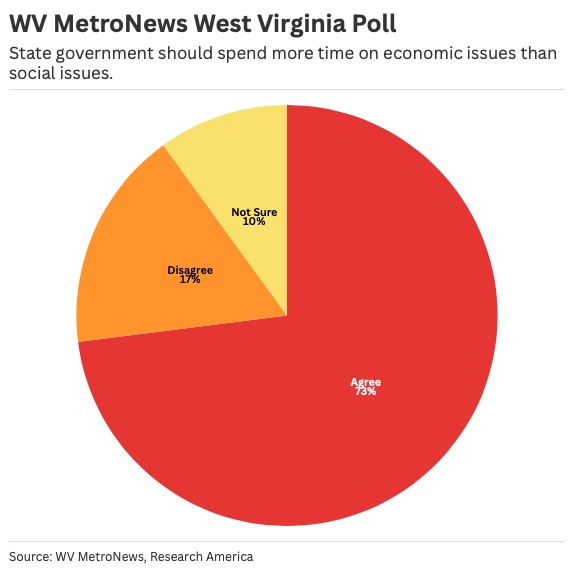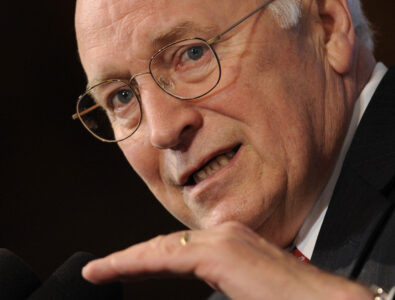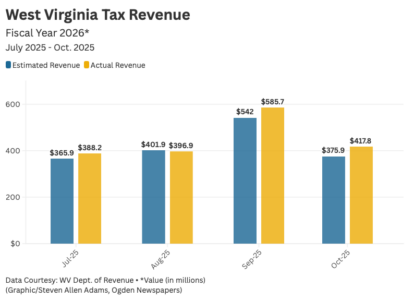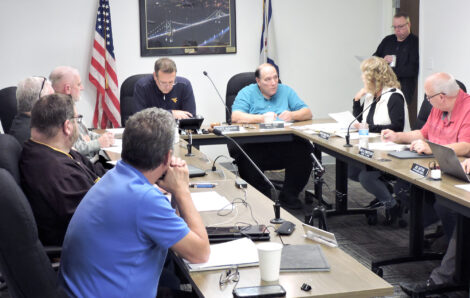Poll: W.Va. residents want more focus on economy

CHARLESTON — As Gov. Patrick Morrisey challenges the West Virginia Legislature to codify his executive order allowing for religious exemptions to school-age vaccines, an annual poll has respondents telling Morrisey and lawmakers to leave the social issues behind.
Rex Repass, the chief consultant for Research America, presented the results of the latest WV MetroNews West Virginia Poll Friday morning on the final day of the 89th West Virginia Chamber of Commerce Annual Meeting and Business Summit at the Greenbrier Resort.
The poll, conducted Aug. 8 through Aug. 21, included 400 registered voters from all 55 counties closely matching West Virginia’s Republican, Democratic and unaffiliated voter registration. The poll’s margin of error is 4.85 percent.
“We try to mirror, as best we can, the electorate, and these are registered voters in our sample,” Repass said. “We also look at the actual registration, and as all of you know, that’s changing dramatically and has been changing dramatically since 2014 in this state, and when the Legislature flipped to Republican for the first time since early 1930s.”
When asked whether state government should spend more time on economic issues than social issues, 73 percent of respondents agreed, with 10 percent disagreeing and 17 percent unsure. These results follow the 60-day regular legislative session, where time was taken up on, among other things — banning diversity, equity and inclusion programs and language in state government and education and closing loopholes to completely ban gender affirming care.
“By a clear majority, nearly three-fourths … said the Legislature should be focusing on economic development issues more than social issues,” Repass said. “That is the way West Virginians see it. They understand and have points of view and attitudes about the social issues of the day, but they want a good economy. They want jobs. They want people coming back to the state.”
Respondents were asked to give their job approval rankings to state and federal elected officials in legislative bodies. Eight months into his first year in a six-year term, U.S. Sen. Jim Justice, R-W.Va., had a 55 percent approval rating, with 23 percent not approving and 22 percent not sure. When asked to rank 14 current and former governors, 32 percent of respondents place Justice — the previous two-term governor — at the top of the best governors of West Virginia.
“We do see that Sen. Justice is perceived as the best governor in our respondent’s lifetime, followed by Joe Manchin (23 percent), and followed by Jay Rockefeller (15 percent),” Repass said. “One of the things we learned here, when you look at now Justice and his favorability ratings and his job performance ratings, they’re all up there in the high 50s to low 60s.”
U.S. Sen. Shelley Moore Capito, R-W.Va., had a 47 percent job approval rating, with 27 percent not approving and 26 percent not sure. Repass said Capito’s approval number is up from 46 percent last year and usually stays between 43 percent and 51 percent.
“However, among conservatives, that’s a 65 percent approval rating; and among Republicans, that’s also 64 percent to 65 percent,” Repass said. “So, she’s also doing well within her party in terms of overall satisfaction with job performance and overall as a senator that represents the entire state.”
Morrisey, who succeeded Justice as governor in January, has a 45 percent approval rating, with 30 percent not approving and 26 percent unsure. That’s up from a 41% approval rating last year when Morrisey was in the final year of his third four-year term as attorney general and coming off of a competitive six-person GOP primary for governor in May 2024. Morrisey ranked fourth for best West Virginia governor, but only had 9 percent — behind Rockefeller but ahead of Arch Moore (5 percent).
Morrisey’s job approval rating was one point ahead of the West Virginia Legislature at 44 percent, while 25 percent did not approve of the Legislature’s job performance and 31 percent were not sure. When asked whether the state was heading in the right or wrong direction, 51 percent said it was heading in the right direction, up from 44 percent last year; 50 percent said the state was heading in the wrong direction, down from 56 percent last year.
“Essentially, the attitude in the state is we are moving forward. But I say that with a cautionary note,” Repass said. “People are concerned about the economy … Is the economy getting better? Is it getting worse? Or is it staying about the same? What we’re seeing is that people are expressing more concern about the economy today than they did last year. And that’s been a trend that has really taken place since COVID.
“There’s alignment with many of the things the Legislature is doing, particularly with respect to economic development issues and creating jobs in the state,” Repass continued. “But there is an underlying latent concern about the economy in the state and people wondering what’s next … That uncertainty that we saw last year and in the previous year and the previous year is growing. And that’s a warning sign, I think, for political leadership in the state.”
Congress had the highest disapproval rating among respondents at 36 percent, with 40 percent approving and 24 percent not sure. U.S. Rep. Riley Moore, R-W.Va., had a 32 percent approval rating, with 18 percent not approving and 50 percent not sure. U.S. Rep. Carol Miller, R-W.Va., had a 42 percent approval rating, with 22 percent not approving and 35% not sure.




